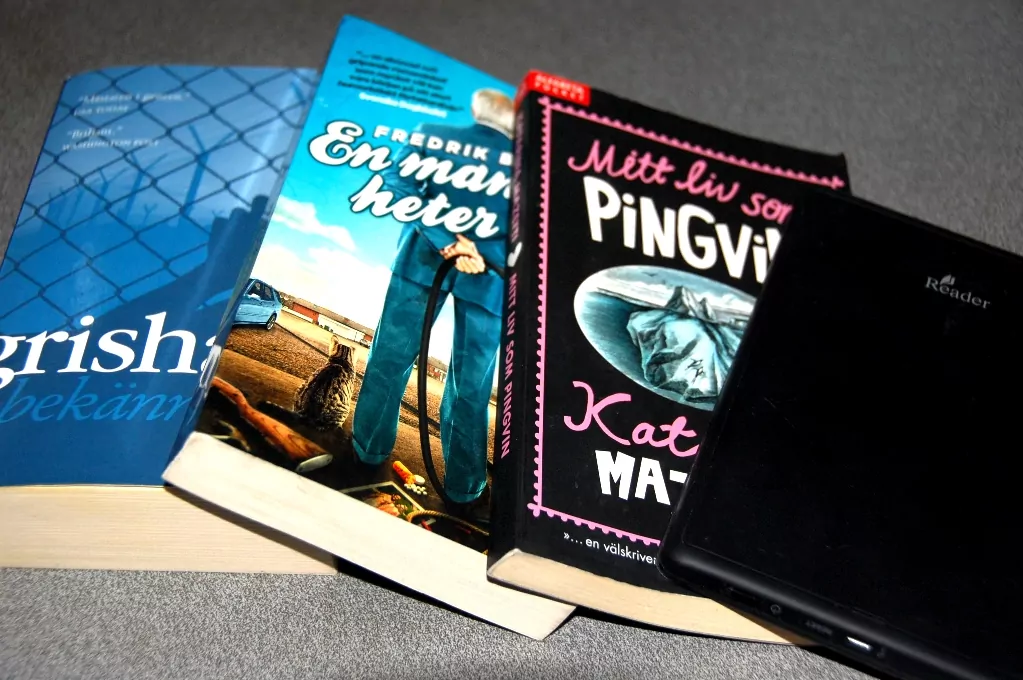Here are some reading tips! Having books to read is perfect when travelling; on the plane, in the waiting hall, on the sandy beach... We both read a lot and primarily use a tablet to be able to download new Swedish books even though we are abroad.
We both humbly thank you for the reading tips we received from you readers a while ago! Here are some book tips/reviews from me, i.e. the books I've read since last time. Peter, who mostly reads crime fiction, highly recommends anything by Arne Dahl and Kristina Ohlsson!
Table of contents
No and I by Delphine de Vigan
French Lou is 13 years old and has an IQ of 160. She is two years younger than her classmates and doesn't fit in anywhere. When they are doing a presentation at school, she decides that the presentation should be about homeless people, and she does her research by interviewing an 18-year-old homeless girl named No.
How come you can build space rockets but can't prevent people from sleeping under bridges? Lou and No become friends, but is it really possible to change things for real? A book with fantastic language that often makes me smile and want to read it again.
Prophecy by Agneta Pleijel
Agneta Pleijel's memoirs describe the life of a 13-year-old professor's daughter in Lund. This might appeal to me, since I too was a 13-year-old professor's daughter in Lund, but I don't recognise myself more than that.
Sometimes I find the book a bit of a mess and think that the writing was primarily therapy for the author. But then everything falls into place. How do you interpret and deal with the world when you grow up? There are so many things adults never talk about: infidelity when it's obvious, God, the meaning of life... The girl tiptoes and guesses, projects, tries to understand...
To be opened in case of my death by Liane Moriarty
Cecilia finds a letter in the attic written by her husband. "To be opened in case of my death" it says. Cecilia refrains from opening it for a long time, but when she realises how stressed her husband is by the discovery of the letter, she can't resist. What is revealed turns life upside down, not only for Cecilia and her husband, but also for a number of other people around them. Do you really know your neighbours? This is not a book I will remember for a long time, but it is an entertaining read.
My life as a penguin by Katarina Mazetti
A group of misfits cruise around Antarctica on the ship m/s Orlovsky. We meet Tomas, who plans to commit suicide among the icebergs, and Wilma, an incurable optimist despite her dark secret. Alba, an elderly woman, observes the wild animals and compares their behaviour with the people on board. A nice and easy-to-read story!
A man called Ove by Fredrik Backman
Fredrik Backman's debut novel received very good reviews and I know many people love this book. I can also understand why - it's humorous and at the same time serious. We get to know the bitter man Ove who, while trying to kill himself in different ways, makes new acquaintances and experiences new dimensions of life. Not really my type of book, but still worth reading!
Confession by John Grisham
John Grisham mostly writes thrillers, which is not my genre, but since Peter thought this book was a bit different, I gave it a try. In The Confession, you meet an American priest who learns the confession of a dying criminal, which means that he has committed a terrible murder many years ago.
A completely different (young, black) man is convicted of the murder and is about to be executed. Is there anything the priest can do and does he have time to intervene before the innocent man is executed? An exciting book about the death penalty and the situation of black people in the USA.
Canada by Richard Ford
Dell and his twin sister live a rootless life in the US in the 1960s, as their father works on air bases and is occasionally transferred between states. When their father loses his job, he goes into various businesses such as selling cars, property and stolen meat.
The increasingly criminal dealings lead, improbably, to a bank robbery by both of Dell's parents. When the parents are caught, the whole family is scattered to the wind and Dell ends up with a distant and very eccentric acquaintance of his mother in the Canadian countryside. The story is nicely told from 15-year-old Dell's perspective.
mirage 38 by Kjell Westö
This book takes us to the intellectual Helsinki of the 1930s. A men's club discusses politics and what is happening in Europe from different political perspectives. Interesting to read about afterwards!
I (who consider myself pretty good at the Swedish language) also get to learn a lot of new words for once! The book is not only educational, but also exciting! Throughout the story we follow Mrs Wiik, secretary to one of the members of the men's club, whose dark secret leads in an unexpected direction.
The first lie by Sara Larsson
This book is about rape and men's violence against women, but above all about society's view of violent men and how they are treated by the legal system. This is of course an important topic and you are drawn into the exciting story, which takes place both in the past and present, both in Sweden and in Thailand. I sometimes think that the story is a bit forced and does not reach the end, but it is still worth reading!
Giving birth to a child by Kristina Sandberg
This is a story about Sweden in the 1930s. Maj becomes pregnant and is forced to marry in order to keep her honour. The marriage is not quite what she wanted and while reading the book I'm incessantly happy that I'm not living at that time. The book is an interesting (female) historical account and if you are interested in Swedish home cooking, it is a goldmine! From the first page to the last, you eat your way through the original Swedish cuisine.
Beckomberga - Ode to my family by Sara Stridsberg
Sara Stridsberg's own father was in Beckomberga mental hospital. This is not an autobiography though, although the main character Jackie's father is also in Beckomberga. I don't know what this is? Sometimes I think it's poetry. In any case, it is incredibly beautifully written, while at the same time it is a historical account of an era in psychiatry that no longer exists.
The selected by Steve Sem-Sandberg
We know (unfortunately) what happened to the Jews during the Second World War. We also know that Nazi Germany, in an attempt to "purify the race", wanted to exterminate people with hereditary diseases and other "bad character traits".
But what happened to the disabled and 'imperfect' children? Well, they were sent to clinics like Spiegelgrund. Here 'treatment' meant euthanasia and the parents, who of course asked for their children, were given a restraining order. Worth reading and eye-opening!














Mr Steve says:
I read a lot after my stroke in 2001 and in 2004 I read "The Alchemist" by Paulo Coelho. It was a book that suited me and gave me a lot at that time and I then read 8 more books by him and thought they gave me "replenishment". When I read his book "Brida" in 2012, I only got a third of the way into the book when I put it aside. Since then, I haven't read anything else by Coelho. I simply had enough of the wisdom being delivered. Maybe it was that I didn't need it anymore or maybe it felt too tacky.
I read my latest book, "Mr Chance" by Niklas Ekdal and Inga-Britt Ahlenius ("Ms Fearless"), last October. I had looked forward to reading it, but had to struggle through it and even skipped the appendix. My appetite for reading is simply not as great anymore. Whatever it may be due to. I guess I have other things that fill my cup of life to the brim. Mystery stories have never been my thing. For me it's novels and documentaries. Still, I'll take a closer look at your tips and see if it can be something for me.
23 July 2015 - 22:48
Åsa says:
Several of those seem really good! I'm reading a lot right now, and am grateful for tips! I personally recommend "Innan floden tar oss" by Helen Thorfinn, about a Swedish family that moves to Bangladesh for the mother to work with aid there. Very interesting!
23 July 2015 - 23:05
BP says:
I totally agree with Peter's choice of books. His authors are also my favourites. But the funny thing is that I actually read only one of your books too: A Man Called Ove. Oh I can tell you that you are the third person now (my colleague Yvonne, you and me) who are probably the only ones who didn't really like that book.
But strangely enough, I have "forced myself" against my better judgement to read his sequels. Oh the guy is actually getting better and better. His last book "Britt-Marie has been here" is actually really good. So - give the guy one or two more chances;-)
Answer: Hey, I'm glad for every comment I get. Since I know exactly what you mean by internet/wifi - the lack of it anyway and the feeling of being totally disabled - I understand very well that you comment "in batches". I also did that in Spain. It certainly stung, but you have no choice. Of course you are "over-harassing" the internet account. It's a lifeline in a way, isn't it!!!?
23 July 2015 - 23:10
admin says:
Steve, the desire to read can go back and forth, but there's nothing wrong with that, is there? I've read a book by Coelho, but I didn't really like it. My mate loved it though, so it's different. I don't know Mr Chance, maybe worth checking out!
Åsa, it's great that you also read a lot and perfect to exchange some book tips! Before the river takes us I have read. Agree, very good!!!
BP, it was you who suggested Arne Dahl!!!!. Many thanks! Peter has read all 14 books by him now 🙂 Interesting that you were not so fond of the book about Ove, but ok, I will not judge 😉 And of course the internet is a lifeline! We choose to prioritise the internet, but still have to hold back a bit....
23 July 2015 - 23:29
Elisabeth says:
I've had a period where I haven't read much. The only book in your list is Ove. I thought it was pretty good, but .... Nice to get tips on new books. The last one I read was Kaos by Alexandra Pascalidou and it gave me another dimension to the Greek crisis. Have a good time!
24 July 2015 - 6:11
Lennart says:
A man called Ove was fun to read!
Coming to the cinema!
Goodbye!
24 July 2015 - 6:33
admin says:
Elisabeth, reading probably goes in cycles for us too. Right now we are reading a lot because we are travelling. Chaos sounds like an interesting book!
Lennart, will there be a film of the book too? Yes, it has been popular ...
24 July 2015 - 8:47
4000mil says:
I also liked The Birth of a Child and its two sequels.
Swedish women's literature is exactly my genre.
Spill, which won the August Prize a few years ago, is another such favourite, as well as Slumpvandring, Hohaj, Glasfåglarna, Häxringarna...
No new books, more classics.
24 July 2015 - 9:16
admin says:
4000 miles, Spill I have read, but not the others. Thanks for the tips! Books don't have to be new to be good! 🙂
24 July 2015 - 9:35
solan says:
Reading tips are always needed. I have a period of biographies, everything from Patti Smith, Ronny Wood to Povel Ramel!
24 July 2015 - 9:51
Ama de casa says:
Right now I am terrible at reading... When we have been out, we have instead listened to old summer chats that we have downloaded to the phones from the net. There is an inexhaustible stock out there - some are not at all good though, but then you just have to jump to the next one 🙂.
24 July 2015 - 10:20
admin says:
Solan, I can also enjoy reading biographies sometimes. I haven't read the ones you mention though.
Ana de casa, that also sounds like a great and interesting pastime! 🙂
24 July 2015 - 10:49